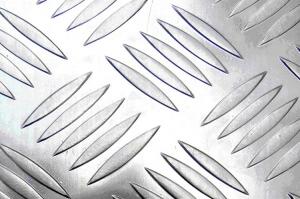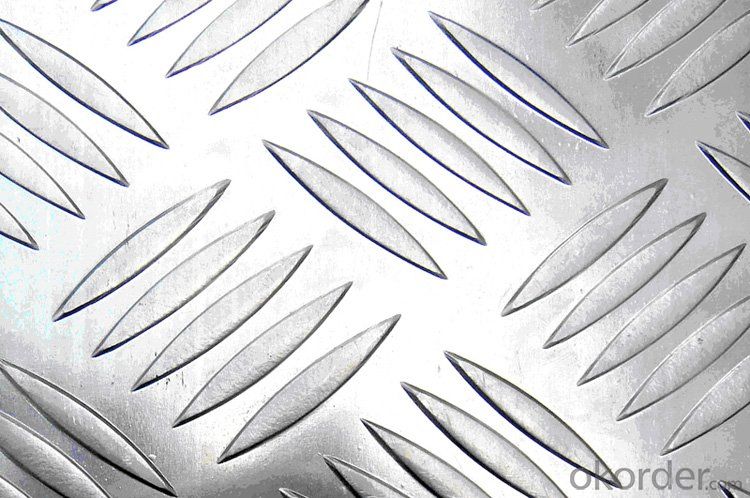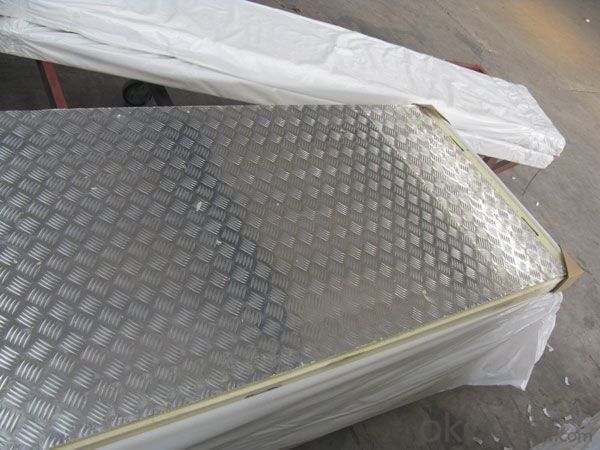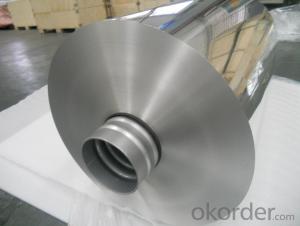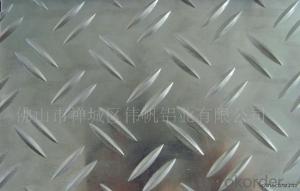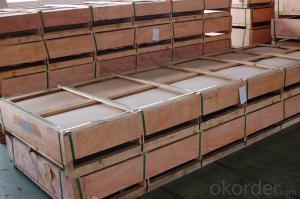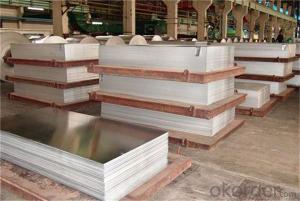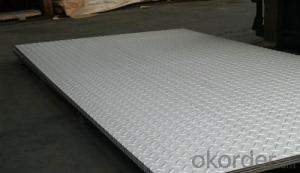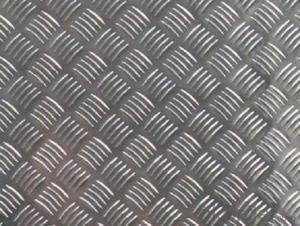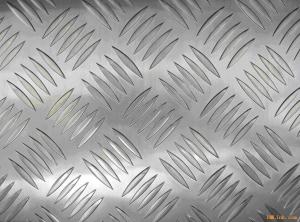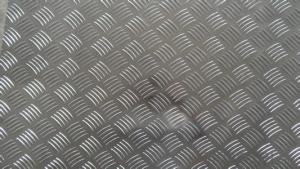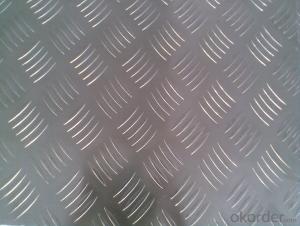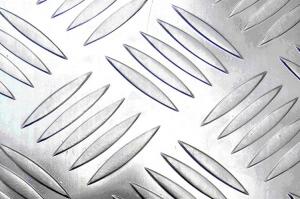Reflective Five-Bar Aluminum Sheets
- Loading Port:
- China Main Port
- Payment Terms:
- TT or LC
- Min Order Qty:
- 4 m.t.
- Supply Capability:
- 100000 m.t./month
OKorder Service Pledge
OKorder Financial Service
You Might Also Like
1.Structure of Five-Bar Aluminum Sheets Description
Five-Bar Aluminum Sheets has great ductility, heat conductivity, anti-corrosion and moisture resistance properties which are very useful in the field of construction.
Five-Bar Aluminum Sheets is widely used for decorative purpose in construction, packing and appiance. It is also very commonly used for anti-slippery purpose in vehicles and public places.
2.Main Features of Five-Bar Aluminum Sheets
• Superior quality of raw material
• Reasonable and stable chemical composition
• Accurate tolerance
• Goode mechanical property
3.Five-Bar Aluminum Sheets Images
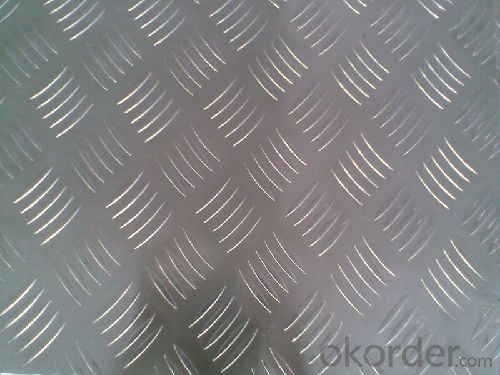
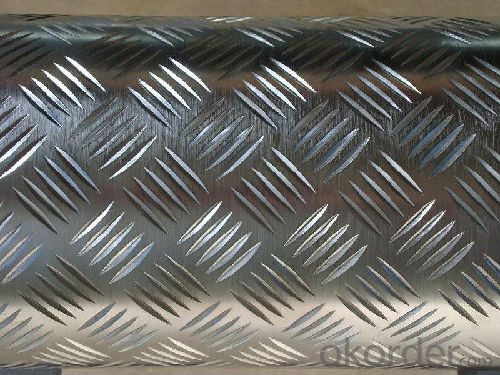
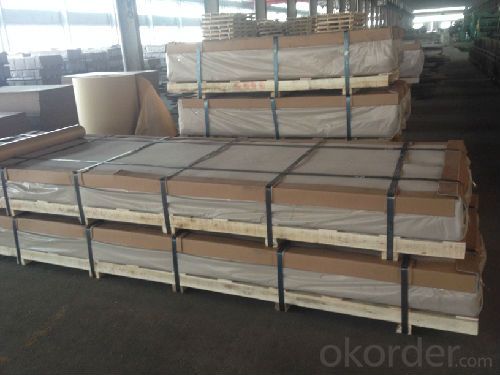
4.AlumFive-Bar Aluminum Sheets Specification
Alloy | AA1xxx, AA3xxx |
Temper | H14, H16, H18, H22, H24, H26, H32, O/F |
Thickness | 0.2mm -- 100mm |
Width | 30mm -- 1700mm |
Standard | GB/T 3880-2006,EN,ASTM,JIS |
5. FAQ of Five-Bar Aluminum Sheets
A.How to guarantee the quality?
Customers are welcome to our mill to visit and check the products. Besides, we can arrange a third party to test Five-Bar Aluminum Sheets products.
B.When will you deliver the products?
The Five-Bar Aluminum Sheets will be delivered within 35 days after receiving advanced payment or original L/C.
- Q: What is the typical impact strength of aluminum sheets?
- The impact strength of aluminum sheets can differ depending on the alloy and temper of the material. Nevertheless, when compared to other metals, aluminum sheets generally possess a relatively lower impact strength. This is due to the fact that aluminum, being a lightweight material, lacks the strength and durability of steel or other alloys. To measure the impact strength of aluminum sheets, one typically determines the energy required to cause the material to fracture or deform, which can be expressed in joules or foot-pounds. Although specific values may vary, the impact strength of aluminum sheets typically falls within the range of 10 to 40 joules or 7 to 30 foot-pounds. It is worth noting that factors such as thickness, surface condition, and the presence of surface treatments or coatings can influence the impact strength. Therefore, it is advisable to consult the manufacturer's specifications or conduct specific tests to ascertain the impact strength of a particular aluminum sheet.
- Q: This question asks for methods to preserve the aesthetic quality of aluminum sheets and prevent deterioration over time.
- <p>To maintain the appearance of aluminum sheets over time, follow these steps: 1. Regularly clean the sheets with a mild detergent and water to remove dirt and grime. 2. Avoid using harsh chemicals or abrasive materials that can scratch the surface. 3. Apply a protective coating or sealant if the sheets are exposed to harsh weather conditions or corrosive environments. 4. Inspect the sheets periodically for signs of corrosion or damage and address any issues promptly. 5. Keep the aluminum sheets dry, as moisture can lead to rust and other forms of deterioration. Proper maintenance will help preserve the appearance and longevity of aluminum sheets.</p>
- Q: Can aluminum sheets be soldered?
- Yes, aluminum sheets can be soldered, but it requires some specific techniques and materials. Aluminum has a high thermal conductivity and a low melting point, which makes it challenging to solder using traditional methods. However, it can be soldered using specialized soldering techniques such as the use of flux and a soldering iron with a high temperature. Additionally, a specific type of solder called aluminum solder or aluminum flux-cored solder is required, as regular solder does not adhere well to aluminum surfaces. It is important to clean the aluminum surface thoroughly before soldering to ensure a strong bond. Overall, while soldering aluminum sheets can be more complex compared to other metals, it is possible with the right tools, materials, and techniques.
- Q: Can aluminum sheets be used for architectural facades?
- Yes, aluminum sheets can be used for architectural facades. Aluminum is a versatile material that offers several advantages for facade applications. It is lightweight, durable, and corrosion-resistant, making it suitable for various weather conditions. Aluminum sheets can be easily fabricated and installed, offering flexibility in design and allowing for intricate and complex facades. Additionally, aluminum can be finished in a variety of ways, including powder coating, anodizing, or painting, to enhance its appearance and provide the desired aesthetic appeal. Overall, the use of aluminum sheets for architectural facades provides architects and designers with a wide range of options to create visually appealing and long-lasting building exteriors.
- Q: Can aluminum sheet be used for medical applications?
- Certain medical applications can utilize aluminum sheet. This material is lightweight, durable, and resistant to corrosion, making it suitable for a range of medical devices and equipment. Prosthetic limbs, braces, and orthopedic implants can be manufactured using aluminum sheets. Additionally, medical instruments like surgical trays, sterilization containers, and imaging equipment can be produced using aluminum. However, it is important to consider that not all medical applications can use aluminum, as some devices may require specific properties or materials to meet regulatory standards and ensure patient safety. Therefore, the use of aluminum sheet in medical applications should be assessed on a case-by-case basis, taking into account the specific requirements and regulations of each application.
- Q: Can 101 aluminum sheets be used in the production of solar reflectors?
- Yes, 101 aluminum sheets can be used in the production of solar reflectors. Aluminum is a widely used material in the solar industry due to its high reflectivity and durability. The number 101 refers to the specific alloy composition of the aluminum, which usually indicates that it is a pure aluminum or a low alloy variant. Pure aluminum has excellent reflective properties, making it ideal for solar reflectors that need to efficiently redirect sunlight onto solar cells or panels. However, it is important to consider other factors such as thickness, surface finish, and any additional coatings or treatments that may be required for optimal performance in solar reflector applications.
- Q: Are aluminum sheets flammable?
- Aluminum sheets, I assure you, are not flammable. Their non-combustible nature is attributed to the fact that aluminum possesses a high melting point of 660 degrees Celsius (1220 degrees Fahrenheit). It neither burns nor supports combustion, rendering it a favored option in numerous sectors, particularly within the construction industry, where fire resistance is paramount.
- Q: Can 101 aluminum sheets be bonded to other materials?
- Indeed, it is possible to bond 101 aluminum sheets with other materials. Aluminum demonstrates remarkable versatility in its capability to be bonded with a vast array of substrates through diverse bonding techniques. Several commonly employed methods for bonding aluminum sheets to other materials comprise adhesive bonding, mechanical fastening, welding, and brazing. The selection of a specific bonding technique hinges upon factors such as the composition of the material to be bonded with aluminum, the desired strength of the bond, and the intended application. Nonetheless, it is crucial to ensure compatibility between the aluminum sheets and the other materials to guarantee the establishment of a robust and long-lasting bond.
- Q: This question asks for a list of various fasteners that are commonly used in the installation process of aluminum sheets.
- <p>There are several types of fasteners used for installing aluminum sheets, including: 1. Self-tapping screws, which create their own threads in the material. 2. Rivets, which join two pieces of material by compressing them together. 3. Pop rivets, a type of rivet that can be installed using a handheld tool. 4. Structural adhesives, which bond the sheets together without visible fasteners. 5. Welding, although not a fastener, it's a method used to join aluminum sheets permanently. 6. Mechanical fasteners like bolts and nuts, which are tightened to secure the sheets. 7. Clips and clamps, used for temporary or decorative installations. Each type has its own advantages and is chosen based on the specific requirements of the installation, such as load-bearing needs, aesthetic considerations, and the environment in which the aluminum sheets will be used.</p>
- Q: Are aluminum sheets suitable for structural applications?
- Aluminum sheets have great potential for use in structural applications. Being both lightweight and strong, aluminum is an excellent choice for various structural purposes. Its high strength-to-weight ratio allows for significant strength while keeping the overall weight of the structure low. This quality is particularly advantageous in industries like aerospace, automotive, and marine, where weight plays a crucial role. Furthermore, aluminum sheets possess excellent resistance to corrosion, making them suitable for structures exposed to harsh environmental conditions or moisture. Their durability and good thermal and electrical conductivity are additional advantages. These properties make aluminum sheets suitable for a wide range of structural applications, including building facades, roofing, curtain walls, bridges, shipbuilding, and electrical enclosures. Moreover, aluminum sheets are highly workable, enabling easy cutting, forming, and welding. This flexibility in fabrication allows for the creation of complex and customized structural components. Additionally, aluminum's natural oxide layer provides a level of protection against corrosion, reducing the need for additional coatings or treatments. However, it is important to carefully consider the specific requirements and loads of each structural application before opting for aluminum sheets. While aluminum is strong, it may not be suitable for heavy-load-bearing applications where steel or other materials might be more appropriate. Proper engineering and design considerations are essential to ensure the structural integrity and safety of the application.
Send your message to us
Reflective Five-Bar Aluminum Sheets
- Loading Port:
- China Main Port
- Payment Terms:
- TT or LC
- Min Order Qty:
- 4 m.t.
- Supply Capability:
- 100000 m.t./month
OKorder Service Pledge
OKorder Financial Service
Similar products
Hot products
Hot Searches
Related keywords
